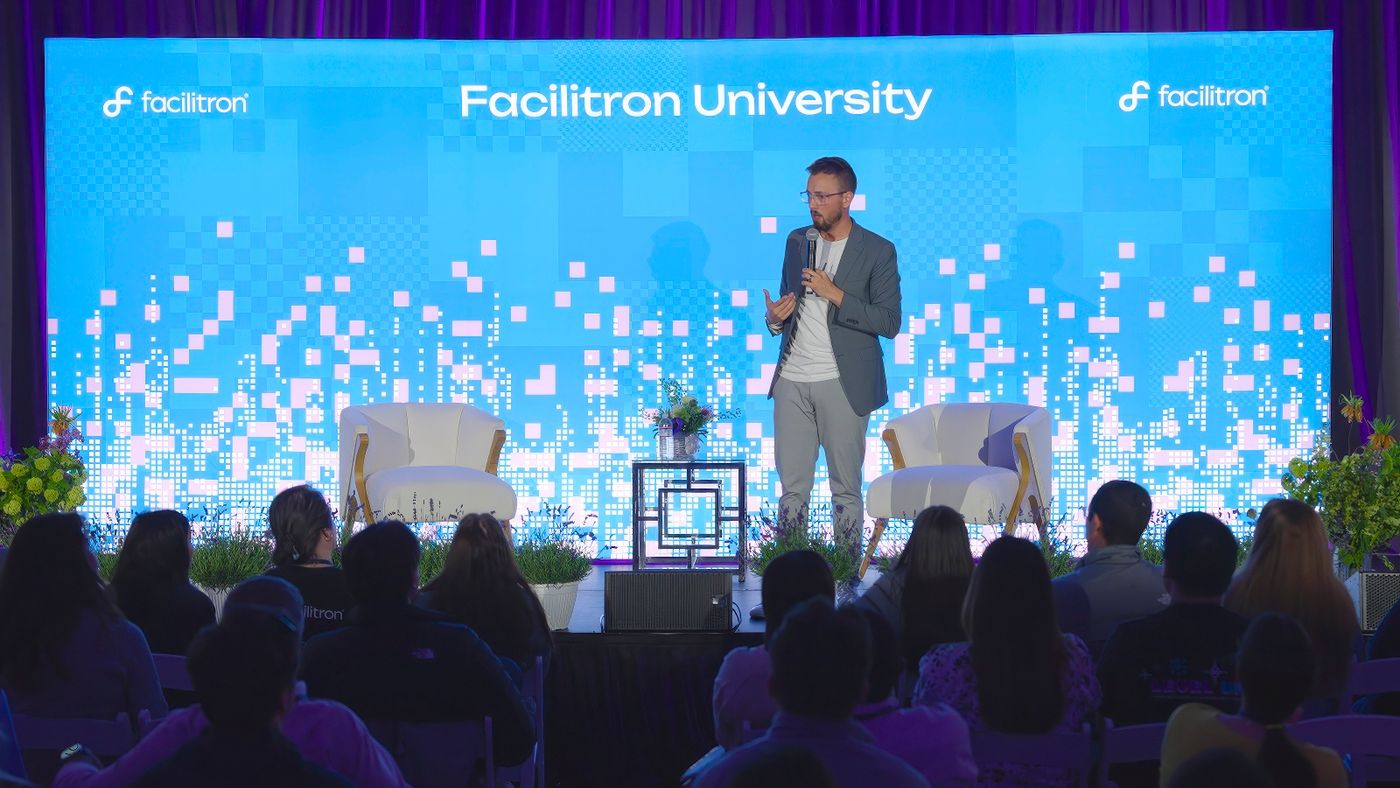Prioritizing Human Intelligence for an AI World with Travis Allen

As Facilitron University 4 came to a close, Travis Allen, education innovator and founder of the Human Intelligence Movement, delivered a keynote that challenged the audience to rethink not just how schools operate—but why they exist in the first place.
View the full session:
Allen’s high-energy session didn’t aim to provide all the answers. Instead, he focused on reframing the questions. “I realize that my job today is not to give you the answers. They’re already out there,” he said. “But what I do know is can I inspire new questions?”
Why Do We Go to School?
Allen began by asking the audience to do something deceptively simple: turn to the person next to them and answer the question, “Why do we go to school?” He noted that while reasons like childcare, academics, and job preparation are commonly cited, we rarely pause to challenge or revisit that core purpose.
Reflecting on education’s historical context, Allen walked attendees through the shift from physical labor to knowledge work—and now, toward a future defined by human skills. “We cannot keep training our kids to compete against AI. That’s a losing battle,” he said. “AI will always be better than me at writing a five paragraph essay.”
Human Skills: The New Competitive Edge
As artificial intelligence rapidly reshapes the workforce, Allen emphasized that the value of uniquely human traits—like empathy, adaptability, and curiosity—has never been greater. He cited findings from the World Economic Forum that identify these “human” competencies as essential for future employment, adding, “The drive and motivation at the end of the day is one of the number one qualities we’re all looking for in people we hire.”
To demonstrate how his own company selects for these skills, Allen shared how they send job applicants an initial email written entirely in Italian. “If you translate this, it says, congratulations, if you’re reading this, we’d like to invite you to our gamified process should you choose to accept this mission,” he explained. Applicants who responded creatively—in memes, Wookiee, or with playful spirit—moved forward. “We’re prioritizing hiring for human skills, not for a resume, not for a knowledge base.”
Rewiring the Learning Experience
Allen described how the way students learn—and what they expect from learning—has been shaped by instant gratification, constant connectivity, and the promise of easy answers. “We are robbing our students of engagement and curiosity when we spoon-feed them the answer,” he said. “Give them big lofty goals and ideas, and let them go.”
He argued that engagement grows when learners confront problems without a clear answer. To illustrate, he shared the story of his company’s mobile escape rooms—pre-COVID installations that dropped at schools to immerse students and teachers in real-time problem-solving. “People would fail, fail, fail, fail trying to open this lock box… but when they finally get it, they’re screaming, they’re euphoric, they’re super excited,” he said. The goal isn’t success, it’s the pursuit of it.
Rethinking Parenting, Self-Efficacy, and Technology
Allen wove in reflections on his own parenting journey, noting that many parents, including himself, have unintentionally outsourced the development of critical life skills.
“Suffering is not the enemy. Not learning and growing from it is the enemy,” he said, after recounting a conversation with his nine-year-old daughter. He argued that we’ve created too many conveniences and removed too many challenges. “Velcro shoes until you’re 18” is how he described one level of over-parenting. Instead, he said, students must learn that they don’t need an adult in the room to solve a problem.
Tech Dependency and Digital Literacy
Allen warned of growing digital dependence—not just on AI, but on the entire technological ecosystem. “We have built ourself up on a house of cards… if any of it were to go down, we are going to be in big trouble,” he said.
He shared that the average screen time for 18-year-olds is now over five hours per day, leaving minimal time for reflection or unstructured problem-solving. The issue isn’t the presence of technology, Allen emphasized, but its unintentional use. “Either you use the internet, or the internet is using you,” he said.
A New Purpose for Education
Looking ahead, Allen argued that the current system—designed during the industrial era—remains intact and functional, but misaligned with today’s world. “It still today does exactly what it was designed to do, and it does it quite well,” he said.
He suggested shifting the conversation from “what job do you want?” to “what problems do you want to solve?” Employers, he said, are now hiring for adaptability, collaboration, and problem-solving—not grades, GPAs, or test scores.
“If the mission and purpose of school is to get an A, we are going to have an uphill battle,” Allen said. “That is a mentality we need.”
Final Message: Rally Around Human Intelligence
Allen closed by encouraging attendees not to rally their districts around technology, but rather around the pursuit of human growth. “If your initiative is an AI initiative, then there will be people for it and people against it,” he said. “Rather than rallying people around AI, how can you rally people around the pursuit of building human intelligence?”
This isn’t about resisting technology—it’s about rising above it. “Good teachers have been building human skills for decades,” Allen said. “The only argument I would make is that some were doing it really well as a byproduct… now, all teachers must be good at building human skills.”

